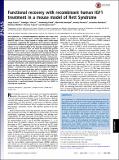Functional recovery with recombinant human IGF1 treatment in a mouse model of Rett Syndrome
Author(s)
Garcia, Rodrigo; Castro, Jorge; Kwok, Showming; Banerjee, Abhishek; Petravicz, Jeremy C.; Woodson, Jonathan; Mellios, Nikolaos; Tropea, Daniela; Sur, Mriganka; ... Show more Show less
DownloadCastro-2014-Functional recovery.pdf (1.545Mb)
PUBLISHER_POLICY
Publisher Policy
Article is made available in accordance with the publisher's policy and may be subject to US copyright law. Please refer to the publisher's site for terms of use.
Terms of use
Metadata
Show full item recordAbstract
Rett Syndrome is a neurodevelopmental disorder that arises from mutations in the X-linked gene methyl-CpG binding protein 2 (MeCP2). MeCP2 has a large number of targets and a wide range of functions, suggesting the hypothesis that functional signaling mechanisms upstream of synaptic and circuit maturation may contribute to our understanding of the disorder and provide insight into potential treatment. Here, we show that insulin-like growth factor-1 (IGF1) levels are reduced in young male Mecp2-null (Mecp2 [superscript − over y]) mice, and systemic treatment with recombinant human IGF1 (rhIGF1) improves lifespan, locomotor activity, heart rate, respiration patterns, and social and anxiety behavior. Furthermore, Mecp2-null mice treated with rhIGF1 show increased synaptic and activated signaling pathway proteins, enhanced cortical excitatory synaptic transmission, and restored dendritic spine densities. IGF1 levels are also reduced in older, fully symptomatic heterozygous (Mecp2[superscript − over +]) female mice, and short-term treatment with rhIGF1 in these animals improves respiratory patterns, reduces anxiety levels, and increases exploratory behavior. In addition, rhIGF1 treatment normalizes abnormally prolonged plasticity in visual cortex circuits of adult Mecp2[superscript − over +] female mice. Our results provide characterization of the phenotypic development of Rett Syndrome in a mouse model at the molecular, circuit, and organismal levels and demonstrate a mechanism-based therapeutic role for rhIGF1 in treating Rett Syndrome.
Date issued
2014-06Department
Massachusetts Institute of Technology. Department of Brain and Cognitive Sciences; Picower Institute for Learning and MemoryJournal
Proceedings of the National Academy of Sciences of the United States of America
Publisher
National Academy of Sciences (U.S.)
Citation
Castro, Jorge, Rodrigo I. Garcia, Showming Kwok, Abishek Banerjee, Jeremy Petravicz, Jonathan Woodson, Nikolaos Mellios, Daniela Tropea, and Mriganka Sur. “Functional Recovery with Recombinant Human IGF1 Treatment in a Mouse Model of Rett Syndrome.” Proceedings of the National Academy of Sciences 111, no. 27 (June 23, 2014): 9941–9946.
Version: Final published version
ISSN
0027-8424
1091-6490